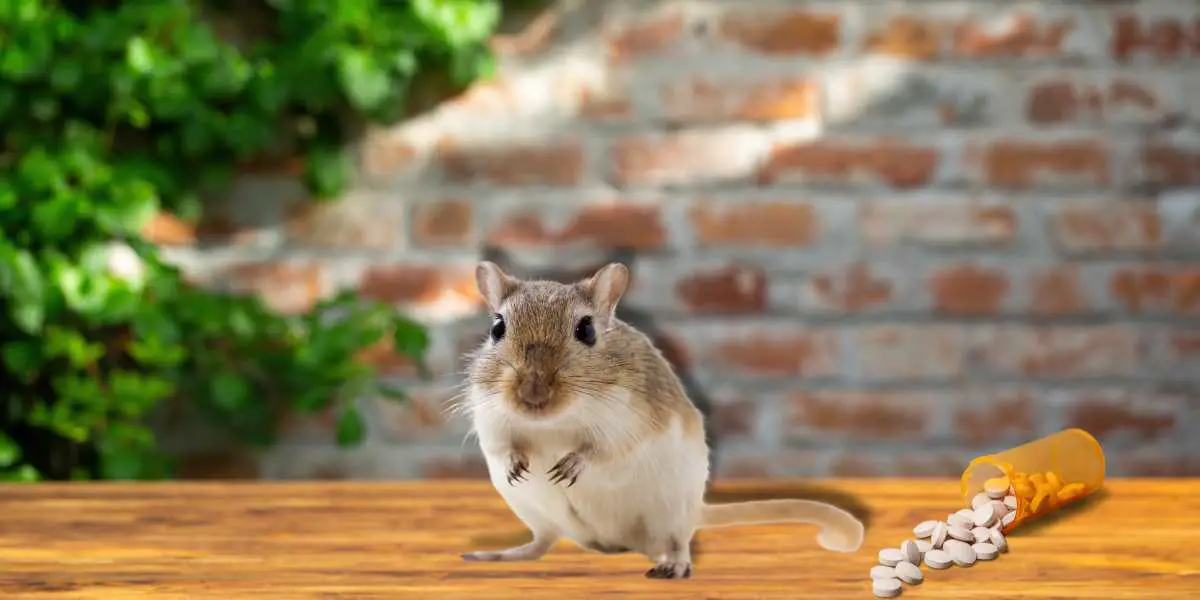Gerbils make wonderful pets for both children and adults alike, but like all animals, they require special attention and care in order to stay healthy. As pet parents, it’s important to learn about common gerbil health issues and how to prevent them.
In this article, we’ll go over some of the most common issues, how to recognize them, and how to keep your gerbil from getting sick in the first place.
Table of Contents
Overview of gerbil health issues
Gerbils are popular pet rodents and generally quite hardy — but all pet owners should be aware of potential health issues that can occur with their gerbils. Being able to recognize common symptoms such and illnesses, along with prevention through proper care, is necessary for the overall health of any gerbil.
Some of the most common health issues in gerbils include:
- bacterial and fungal infections,
- skin parasites,
- dental problems,
- ear mites,
- respiratory illnesses,
- intestinal worms
- and other intestinal problems associated with a poor diet.
Gerbils may also be susceptible to stress-related conditions due to confinement or lack of social contact which can lead to depression or aggression. Being able to detect these conditions early on will ensure successful treatment for your gerbil.
It’s important for gerbil owners to stay up-to-date on nutrition as well as general health requirements that are specific to their type of gerbil. This includes things like water availability (gerbils may drink more than necessary if tap water is not readily available), exercise (gerbils need time outside the cage to stay physically active), and the type of food a particular species needs in order for them to remain healthy (carrots are a good source of vitamins and minerals). Additionally, socializing for young gerbils ‘ weaning age is important for properly developing emotional skills later on in life.
Keeping these basic tips in mind when caring for your pet gerbil can help keep them healthy and happy over their lifetime!

Common Gerbil Illnesses
Gerbils are small, furry mammals often kept as pets. Just like any pet, they are susceptible to a variety of illnesses. Knowing the most common gerbil illnesses is an important part of being a responsible pet owner.
Respiratory Illnesses
Respiratory illnesses such as Mycoplasmosis, Coryza, and Respiratory Infection can be contracted by gerbils through contact with infected animals or inhaling infective air particles. Objects such as food, bedding, and water sources that are not clean and are coming in contact with other animals which may have been exposed to the virus can also be a source of transmission.
Signs of respiratory illnesses include:
- Labored breathing
- Discharge from eyes and nose
- Wheezing
- Soft chin due to enlarged lymph nodes around the jaw (mycoplasmosis only)
If your gerbil exhibits any of these symptoms, take it to the vet for a checkup when possible. The vet will be able to properly diagnose any condition your pet could have as well as prescribe an appropriate treatment plan. It is important to note that some respiratory illnesses may require antibiotics or other treatments so it is crucial that you seek professional help early if you spot any signs of illness in your pet.
Prevention is always better than treatment so make sure your gerbil’s environment and items they come into contact with, such as bedding and food bowls, are always kept clean in order to reduce the risk of infection.
Care should be taken when introducing new members into an existing family of gerbils – quarantine new arrivals for at least 2 weeks before letting them mix with those already living together. Regular vet checkups can also help catch signs of illness before it becomes serious or even untreatable.
Skin Conditions
Gerbils have a tendency to suffer from various skin conditions. These problems can stem from the environment in which your gerbil lives to allergies and other causes. Some of the most common skin conditions are listed below.
Mites: Mites are quite common in gerbils, and signs of infestation often include itching, soreness or inflammation of the ears, patches of fur loss and aggression or timidness due to discomfort. These mites live on the surface of your gerbil’s skin and can spread easily between individuals, so it’s important for you to take action immediately if you notice signs.
You should also ensure that pets sharing a home with your gerbil are regularly checked for mite infestations as well, as they can be transferred to other animals easily through contact or grooming products shared with an infected individual. To treat mite infestations in gerbils, ask your vet about medications such as ivermectin or fipronil that will kill both adult mites and their eggs quickly and effectively.
Ringworm: Ringworm is another common skin condition found in gerbils caused by a fungus called Microsporumcanis. The infection has no odor but appears as white dandruff-like spots on the fur around the neck, head, and shoulders; reddening of the skin; or hair loss around these areas where it is difficult for the animal to groom normally due to inflammation or soreness.
A fungal culture may be required for diagnosis, but most ringworm infections can be treated with topical antifungal creams available from your vet along with regular cleaning of all surfaces that come into contact with your gerbil to prevent further spread of infection.
It’s important not to overlook this problem because it can also be transmitted from one individual pet to another via direct contact or objects such as bedding made from straw or cardboard that contain spores present before laundry washing them at high temperatures is recommended afterward.
Gastrointestinal Issues
Gastrointestinal issues such as diarrhea and vomiting are some of the most common gerbil health problems. Diarrhea can be caused by the intake of high-fat foods, bacterial infections, digestive tract parasites, or other causes such as environmental changes or antibiotics. Vomiting can be caused by food poisoning, infections, parasites, and environmental factors.
It is important to determine what is causing your gerbil’s gastrointestinal complications in order to treat it properly. Consult your veterinarian for proper diagnosis and treatment options if needed. Prevention is also important and can be achieved through regular vet checkups and proper diet and sanitation. Feed your gerbil fresh vegetables such as carrots, broccoli, or turnip greens to provide the essential vitamins necessary for a healthy gastrointestinal system. Avoid processed food whenever possible as these contain higher levels of fat which put more strain on digestion.
In addition to diet changes and regular medical check-ups, sanitation measures are also important in preventing gastro illnesses in gerbils. Deep cleaning cages regularly with hot water and soap will reduce the chances that harmful bacteria have time to accumulate in their environment. Disinfect all toys regularly using diluted bleach solutions or another commercial disinfectant. Regularly inspect your gerbils for signs of illness or distress so that you can recognize potential problems early on before they become major issues.
Prevention and Treatment
As any pet owner knows, proper care and attention to their pet’s health is important. Gerbils are no exception.
Gerbils may be small, but they can suffer from a variety of ailments, just like any other animal. Therefore, it’s important to understand how to prevent and treat common gerbil health issues so that you can keep your pet healthy and happy.
Vaccinations
Vaccinations provide protection against common illnesses and are an important part of any pet health care plan. Vaccinations are available for gerbils, however, they are not recommended unless a veterinarian determines that they are necessary, as the risk of vaccine reactions in gerbils may be greater than the benefit. For this reason, an overall risk factor assessment should be done on an individual basis before vaccinating a gerbil.
If vaccinations have been recommended by a veterinarian, then annual boosters should be provided to ensure your pet is protected against certain illnesses. Vaccinations commonly used in gerbils will depend on the diseases prevalent in your region and the recommendations of your veterinarian. Depending on geographic location, some anti-viral treatments may also be required for gerbils housed outdoors.
When taking your gerbil outdoors it is important to remember to only do so under the direct supervision and to always keep them safe from predators.
Proper Diet
A healthy and varied diet is a fundamental part of any gerbil’s health care. It should include a proportioned amount of proteins, carbohydrates, and fats. A quality lab-block type feed, supplemented with fresh foods, may provide gerbils with all the nutrition they require to stay healthy. Fresh foods and treats should include items such as live insects, cooked green vegetables and fruits, nuts, seeds, and grains (except sorghum and milo). Bread can be offered in moderation because it contains sugar and salt which are not beneficial for your gerbil’s health.
Commercial yogurt drops are safe for your gerbils but always remember to offer them only in moderation as they contain added sugar or sweeteners that can interfere with the natural digestive flora balance in their gastrointestinal tract. This can lead to further issues such as obesity and diabetes. Avoid sugary snacks or snacks that contain artificial colorings or preservatives as these will be dangerous for your gerbil’s health.
Ensure water is available at all times as water is an essential component of any diet; it helps regulate body temperature, and helps muscles contract properly during physical activity thereby ensuring that muscles stay healthy; it regulates digestion; it also helps filter out toxins from their bodies whilst supporting the hydration of other body systems like the circulatory system. If providing water bowls isn’t possible then consider using a drip system instead in order to keep hydration levels up throughout each day/night cycle.
Do also note that although hay has the necessary fiber content which promotes good digestion fluency there won’t be enough calories or necessary vitamins provided by solely consuming hay alone so do make sure to supplement a hay diet with other necessary nutrients too like calcium among others in order to stabilize overall body functions.
Exercise and Enrichment
Exercise and enrichment play an important role in helping to keep gerbils well-rounded, both mentally and physically. Gerbils are often kept alone, so it’s important to provide them with plenty of exercise and stimulation.
Exercise can help keep your gerbil healthy by keeping their bodies active, while enrichment can help with mental development.
Provide your gerbil with a wheel or other type of digging and running apparatus to encourage exercise. Gerbils are social creatures, so if you are planning to keep more than one it’s important that you provide them each with their own wheel. Hide some treats around your gerbil’s enclosure for your gerbil to search for and find – this constitutes as an enrichment activity for them! It’s also recommended that you change the layout of the cage every once in a while to give them something new to explore.
Conclusion
In conclusion, gerbils are generally healthy animals and there are measures that can be taken to help prevent illnesses. If a gerbil displays any signs of sickness, it is important to take them to the veterinarian as soon as possible.
Moreover, it is important to provide a healthy diet, and proper housing, and keep their environment clean and stress-free. It is also wise to get regular check-ups for your gerbil to make sure they are healthy and have a long and healthy life.



